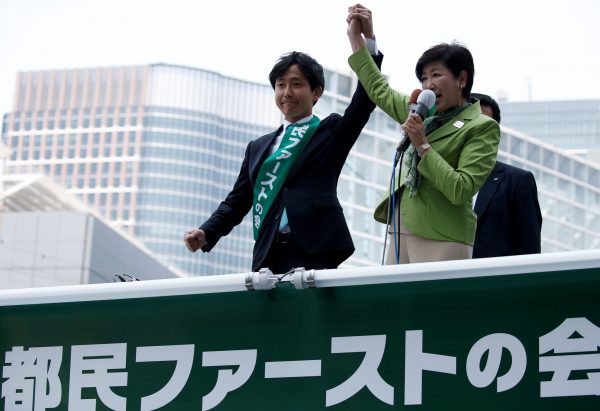Japan’s ruling party, the Liberal Democratic Party (LDP), which held 57 seats in a 127-seat assembly, suffered a crushing defeat. It won only 23 seats, its lowest result ever. On the other hand, the Tomin First no Kai (Tokyoites First), a fledgling party cobbled together only a few months ago under the leadership of Governor Yuriko Koike, won 49 seats — beyond the expectations of many political pundits. Together with its political ally Komeito’s 23 seats, and six independents, who later joined Koike’s party, the Tomin First now has a significant majority in the assembly.
Tokyo, of course, is no ordinary local entity. Home to some 13 million people with a budget of 14 trillion yen (US$120 billion) and Japan’s financial and political capital, its impact on national politics is significant. Political changes in Tokyo very often serve as a barometer of national politics.
Koike’s landslide electoral victory last year for the governorship of Tokyo gave her national prominence. Although an LDP parliamentarian at the time, she presented herself as an independent candidate because the Tokyo LDP branch did not endorse her. Her critical view of the Tokyo LDP leadership, flamboyant personality and skilful media engagement caused voters to flock to her.
However, the LDP-dominated assembly was a stumbling block to her ideas and plans, whether in relation to moving the Tokyo fish market to another location or wastage of resources on the 2020 Olympic Games. To that end, she began to assemble a new group of people who would support her ideas and were willing to participate in politics Koike-style. The party she formed consisted largely of the members who regularly came to the Koike ‘study group’ or ‘preparatory school’.
Furthermore, she skilfully forged an agreement with Komeito, the Buddhist party in alliance with the Abe government nationally. Koike convinced Komeito to sever its ties with the Tokyo LDP and instead support her group in the assembly, setting herself in a politically advantageous position.
Meanwhile, several scandals in the Abe cabinet related to educational institutions —and the alleged involvement of the head of the LDP’s Tokyo branch in one of these scandals — provided tailwinds to Koike’s political design.
While Koike has emerged as a powerful political personality holding the Tokyo governorship with an assembly that would be largely in agreement with her policy agenda, the question can still be asked whether she is genuinely interested in reforming politics and policy in Tokyo, and work for Tokyoites, as she has declared. Or whether she has a larger political agenda and her eyes set elsewhere.
History can be some guide here.
Only a few years ago, Toru Hashimoto, Osaka’s governor and later Osaka mayor, was touted as a future national leader. But his meteoric rise and fall serves as a reminder of how political circumstances can change and local leaders with national ambition fail miserably if they don’t deliver what they have promised.
It is not the first time that the LDP has lost its status as the largest single party in the Tokyo assembly. It was indeed as recently as 2009 that the Democratic Party of Japan won 54 seats to become the largest single party in the assembly, while the LDP had to contend with only 38 seats. But the LDP returned to a much larger number of seats and regained its largest party status four years later in the 2013 elections.
Politics is a strange game.
When Yoichi Masuzoe was elected governor of Tokyo in 2014, no-one would have imagined his resignation half-way through his term, given his popularity and concern for Tokyo residents. But he fell on his own sword when his involvement in financial scandals was revealed, paving the way for Koike to replace him.
Although she ran against an LDP candidate as an independent, Koike’s links with the LDP remained strong during her campaign and only in June 2017 did she formally resign from the LDP. She still maintains close ties with Prime Minister Abe and some senior LDP members. Many of her ideas, whether related to constitutional amendment or Yasukuni shrine, are in sync with those of Abe’s.
It is not Koike’s popularity so much that has damaged the LDP. The party’s old-style politics and arrogance arising from its super majority in the Japanese parliament, combined with the behaviour and action of its politicians, have bruised the party significantly. Although Abe has plans to seek a third term as president of the LDP and remain Japan’s prime minister, given these developments, it may be difficult now. There are others in the party who are waiting for their turn.
Koike and her new party’s success in Tokyo is a wake-up call for the LDP and Prime Minister Abe. We will have to wait and watch closely to see how the party handles these challenges and reverses its fortune. But any political instability will be bad news for Japan.
Purnendra Jain is Professor and head of Asian Studies at the University of Adelaide.


If Koike’s ideas are largely ‘in synch’ with Abe’s then this indeed may be more of a protest against Abe’s arrogance and the school related scandals than a vote for substantial change. Her being a woman in such a patriarchal country as Japan is at least interesting, if not significant.
Admittedly, Japan is facing big demographic, economic, and security challenges. So far Abe’s policies have been so sclerotic and focused on restoring Japan to some kind of idealized past that some ‘political instability’ might not be a bad thing. If not Koike, in my opinion somebody needs to move Japan forward in a dramatic and creative way.